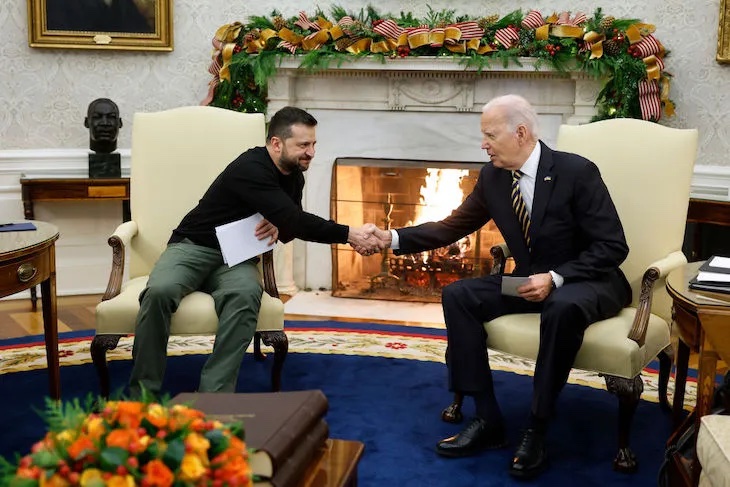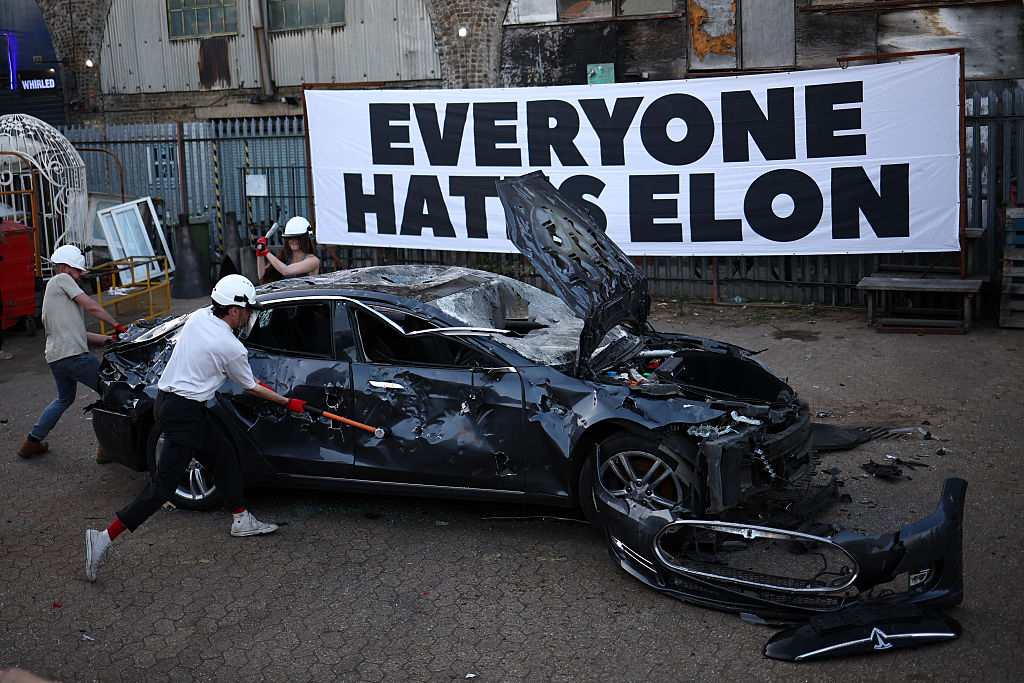Ukrainian president Volodymyr Zelensky’s visit to Washington a year ago was a love-fest, characterized by standing ovations from American politicians, lavish praise from President Biden and a commitment to keep the aid flowing. His visit this week, however, occurred in a much different atmosphere.
The politics of Ukraine aid have changed, with a growing number of Republican lawmakers wondering whether sending more taxpayer dollars to underwrite a stalemate is a wise course of action. While Ukraine’s cause has received a better hearing in the Senate, Mitch McConnell, the minority leader, is intent on using the Biden administration’s $106 billion national security supplemental request (more than half of which is earmarked for Ukraine) to press for tougher immigration laws. The frontline in Ukraine has barely moved in places over the last year — or, where it has moved, the advancements have been so marginal as to be practically meaningless in the grand scheme of things.
Zelensky understood he had a steep hill to climb. His two days in the US capital consisted of a dizzying number of meetings. On December 11, he delivered a speech to the National Defense university essentially making his case that Ukraine was fighting for all the world’s democracies. US lawmakers, Zelensky argued, are only helping Russian president Vladimir Putin by dillydallying. “If there’s anyone inspired by unresolved issues on Capitol Hill,” the Ukrainian president remarked, “it’s just Putin and his sick clique.” It was an interesting public relations strategy, akin to shaming the very legislators that have already doled out more than $100 billion in US taxpayer assistance for Kyiv’s war effort.
The bulk of Zelensky’s time was spent on Pennsylvania Avenue. His first stop was Capitol Hill, where he briefed senators on the state of the war, Ukraine’s strategy for winning it, and the weapons systems required to make that strategy a success. He was escorted by the top Democrat and Republican in the chamber, as if to signal to Putin that Ukraine still had bipartisan support. Senate majority leader Chuck Schumer emerged from the meeting to tell reporters that Zelensky “needs the aid quickly” if the Ukrainians have any chance of winning the war. If not, the Russians could begin to see success again and the Ukrainian army will have adopt the tactics of an insurgency.
Keeping the checks rolling, of course, is easier said than done. If Zelensky sought to convince Republican senators to separate Ukraine aid from Washington’s domestic immigration debate, he failed to move the needle. “We definitely want to help them,” Senator Dan Sullivan said, referring to Zelensky. “There’s no doubt. We just have to have a serious border deal. We’re not budging on it.”
The Republican leadership in the house of representatives is even more insistent on the matter. Speaking before Zelensky’s session in Congress, House Speaker Mike Johnson repeated his position: if the White House wants to help Ukraine with tens of billions of additional dollars, it must do something to straighten out the mess on America’s southern border. Johnson’s message didn’t change after meeting Zelensky: “Our first condition on any national security supplemental spending package is about our own national security first.”
These are ominous words for Zelensky, a man with a ton of star power and goodwill left in the tank. The last thing he wanted was to be pushed into the middle of a decades-long tug-of-war over immigration, the third-rail of American politics. Alas, that is where he has ended up through no fault of his own.
On the other side of Pennsylvania Avenue, the White House remains all-in. President Biden, secretary of state Antony Blinken and defense secretary Lloyd Austin continue to whisper sweet-nothings into the ears of Ukrainian officials in public about the US supporting Ukraine for as long as it takes. Biden made the point for the umpteenth time and tried to buck up Zelensky’s mood, telling him not to lose hope no matter how dire the situation may seem.
Yet as counterintuitive as it may appear, the boasting does Ukraine a disservice, particularly if it’s not accompanied by some tough, clear, honest talk behind closed doors about where the war is heading, as well as America’s capacity to sustain Kyiv’s defense efforts. In public, Biden and his national security staff want to project strength, resiliency and confidence: strength to teach adversaries worldwide a lesson, resolve to outlast Putin’s war of attrition and confidence that Ukraine will recapture every inch of land from the Russian invaders.
That’s all well and good. It sounds great in front of the cameras and demonstrates leadership as the election campaign season approaches. But in the real world, policymakers can’t engage in wishful thinking or base their policies on the hope that something they can’t control will bail them out. Biden may be the world’s most powerful man, but he doesn’t control the US Congress and he doesn’t control the purse strings. Biden can’t tell Zelensky then with any degree of assurance that Washington will indeed support the Ukrainian war effort for as long as it takes.
Some within Zelensky’s orbit are still working on the assumption that US aid will continue well into the future and that congress will, sooner or later, pass another round of war funding. But for Ukraine’s own sake, US officials ought to stop the happy talk and start embracing the reality staring them in the face. Ukraine, above all, deserves honesty from the United States, and Zelensky’s latest visit to White House was a golden opportunity to deliver it.
This article was originally published on The Spectator’s UK website.


























Leave a Reply